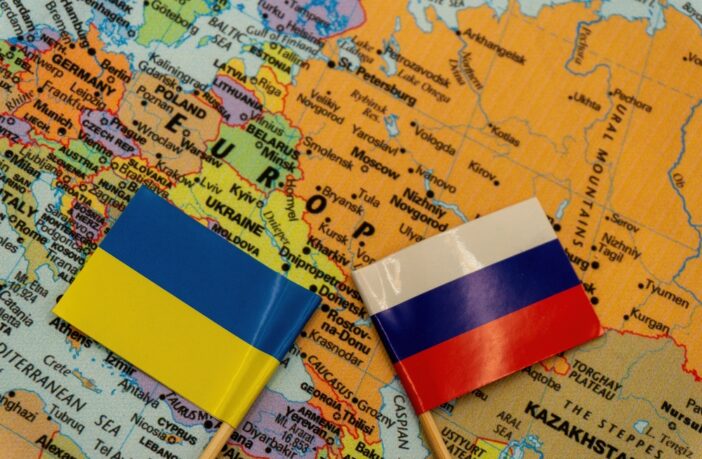Dr Precious Chatterje-Doody is a lecturer in politics and international studies at the OU and specialises in communication, misinformation and security, particularly in Russia. Here she looks back on a year of war in Ukraine – lessons learned and reasons for an increasingly isolated Russia.
Russia’s stated aim in invading Ukraine in 2022 was to achieve “demilitarisation and de-Nazification” – essentially a pretext for regime change in Kyiv.
It clearly anticipated a replay of its successful five-day war with Georgia in 2018 – Russian state media even accidentally published a pre-prepared article written as if victory had actually taken place.
Clearly, Russia had not accounted for the Ukrainian resistance, nor that President Zelenskyy – whom the Kremlin saw as a pampered celebrity – would stay behind and lead it.
Putin’s changing objectives and the West’s previous mistakes
Putin portrayed Russia’s annexations of Eastern Ukrainian regions as the will of the people – despite clearly manipulated referenda, and Russia’s flimsy hold on much of the relevant territory, which Ukraine subsequently liberated.
Russian state media graduated from the so-called objective of “de-Nazification” to “de-Ukrainisation” – an openly genocidal argument about Ukraine being a made-up country with no right to exist.
Prior to the invasion there had been inadequate international responses towards Russia’s 2008 war with Georgia, 2018 Salisbury poisonings, and 2014 illegal annexation of Crimea – which set in motion the antecedents of today’s war.
Russia’s major miscalculations
In spite of co-ordinated diplomatic expulsions at the time, Russia still hosted a record-breaking FIFA World Cup a few weeks later, using it to great PR effect.
The Kremlin basically took this as a green light for its 2022 invasion, but it miscalculated. Western countries gave early warnings of intelligence about Russian tank movements and helped pre-debunk its narratives of Ukrainian provocation.
Unprecedented military aid has kept Russia on the back foot; Russian media operations have been disrupted in the Euro-Atlantic space; and the UN Security Council has refused to platform bad-faith motions by which Russia mirrors its alleged crimes onto others. These changes mean that Russia cannot simply revert to “business as usual”.
Russian alliances are crucial
Russia’s alliances have helped shaped its invasion. In the early stages of the war, Russian attacks from over the Belarus-Ukraine border massively increased Kyiv’s vulnerability.
Subsequently, Russia’s war effort has relied on Iranian and North Korean drones and missiles.
As Putin’s rhetoric and actions have become more extreme, his less-isolated allies like India and China have expressed doubts about the war, but abstained on crucial UN resolutions.
But Ukraine has powerful allies, too
Ukraine’s defence has also relied heavily on support from allies. US intelligence first predicted the invasion, and internationally co-ordinated sanctions on Russia soon followed.
Since then, there has been an unprecedented supply of arms and a warm welcome for (some) Ukrainian refugees. If Russia was counting on a loss of allies’ will for its success, then it has so far been disappointed.
But much can change on the ground during lengthy delays between allies’ promises and their delivery. Ukraine’s continued resistance is contingent on timely and ongoing military and humanitarian support from its allies.
Human stories have real power
The conflict has demonstrated the power of human stories to generate sympathy and political action in the reception of narratives by the presidents of Ukraine and Russia.
Zelenskyy makes a good underdog: celebrity turned statesman who has risen to the challenges of his time – an excellent figurehead for the Ukrainian people who have had to rise to a challenge not of their choosing.
By contrast Putin has aptly filled out the cartoon villain role. Not only has he launched an unprovoked war of choice, but his regime and its proxies have committed multiple atrocities, the likes of which state media representatives have shamelessly promoted on TV.
Contemporary political communication relies heavily on its capacity to engage people’s emotions, and both sides have used humour in different ways to engage online audiences.
Yet, their stories hit differently across the world. Ukraine’s courageous underdog story has resonated in the western world, which has seen itself on the receiving end of Russia’s overseas adventurism.
By contrast, Russia’s portrayal of the war as a response to western leaders’ provocations has resonated better across much of the Global South, still attuned to its colonial experiences.
Perception is very much conditioned by prior experiences, and it is crucial to remember this when trying to build consensus internationally.
Who wins the global narrative
Russia’s image as a master manipulator of political communication has slipped. Its war on Ukraine has demonstrated this and Ukraine’s allies have learned lessons about how to resist Russia’s attempts to control global narratives. Ukraine has proven to be an effective communicator on the world stage in its own right.
A pariah state in much of the West, Russia has shifted its focus towards the Global South. India’s abstention on key UN resolutions demonstrates that Putin’s tactic has had some success.
This is particularly the case where there are historic and cultural reasons to relate to Russia’s stories about resisting Western leaders.
But the UN voting records also show how Russia’s attempts to court public and political opinion have fallen short across large swathes of the world. The war has removed the veneer of respectability from Russia’s foreign policy. A year in, it looks increasingly globally isolated.
Picture credit: Evan Huang for Shutterstock



